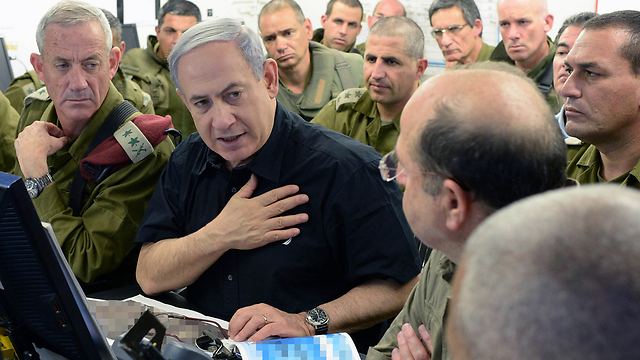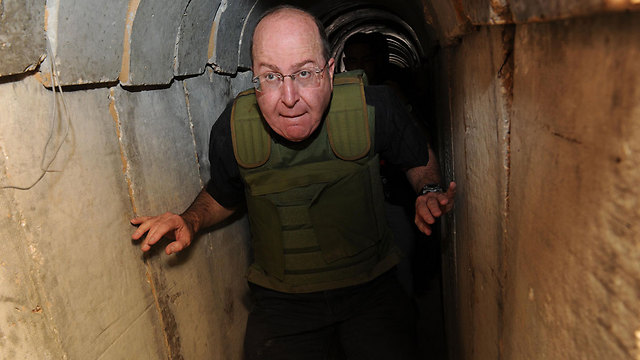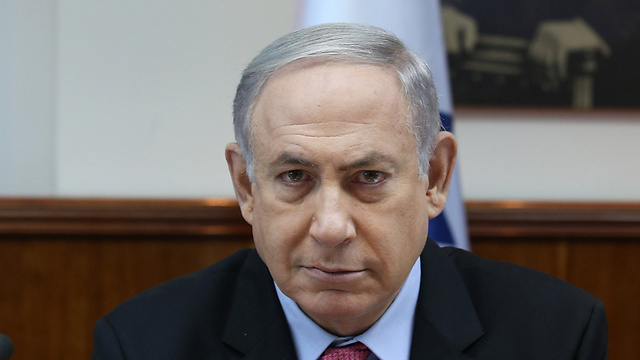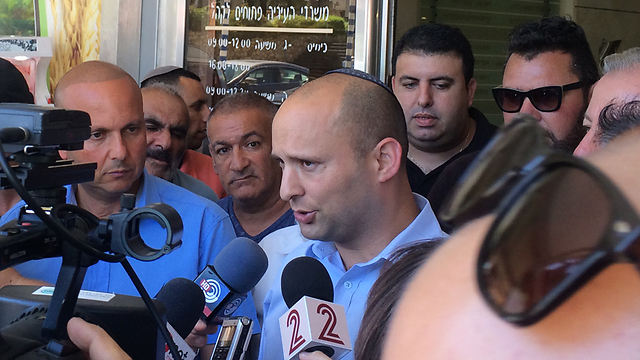
Cabinet minutes reveal failure to detect escalation on eve of 2014 Gaza war
State comptroller’s report offers a peek into the Security Cabinet's discussions before and during Operation Protective Edge. Quotes cleared for publication reveal that it took the cabinet about a year to start discussing strategic goals concerning Gaza, relevant information was withheld from the ministers and the tunnel threat was hardly mentioned although Prime Minister Netanyahu was aware of it even before the government’s establishment in March 2013.
In his report, State Comptroller Yosef Shapira points to the fact that for about a year—from the cabinet’s establishment on March 18, 2013 until March 23, 2014—the cabinet held no discussions aimed at setting strategic goals concerning Gaza.
In the cabinet discussion held on March 24, 2013, in which the state of affairs on the northern front was presented to the new cabinet members, Prime Minister Benjamin Netanyahu noted that Gaza was becoming a strategic threat to Israel. About a week and a half later, on April 3, in a discussion which reviewed the Palestinian arena, Netanyahu noted that “Gaza has become a real threat to the country.”

In a cabinet discussion from March 13, 2014, in light of an escalation in Gaza, then-economy minister Naftali Bennett protested the fact that “We lack a strategy.”
Gilad Erdan, who served as the minister of home front defense at the time, commented that “in the year that I have been a member of this cabinet, not a shred of information has been added that could enable me to make a decision on a long-term policy.”
The cabinet ministers were required to deal with the question of strategic goals during Operation Protective Edge. The issue was first raised in the cabinet discussion a day after the operation was launched, on July 8, 2014. Asked by Bennett what should be done, then-Mossad director Tamir Pardo replied: “I am defining the problem for you. You are the political echelon, not me. You have to define the goals.”
Then-finance minister Yair Lapid noted that “we never even held a discussion on whether we want the Hamas rule in Gaza to continue.”
Yuval Steinitz, the minister of strategic affairs and intelligence, said: “We are focusing on tactics and keep escaping, again and again, year after year—for nine years now we have been escaping from the strategic reality forming before our eyes.”
In his testimony before the state comptroller’s team, then-defense minister Moshe Ya’alon stated that “the cabinet’s main job is to discuss different scenarios in advance—not during the fighting—and to plan an endgame. The cabinet is supposed to deal with policy questions. Such discussions were not held in that cabinet.”
Cabinet discussions on threats posed by Gaza
The State Comptroller’s investigation further revealed that relevant information, which was significant in case of an escalation in Gaza and was raised in discussions within the defense establishment, was not presented to the cabinet ministers in full.
In an internal IDF discussion held on May 8, 2014, then-IDF chief of staff Benny Gantz concluded that “the situation in the Gaza Strip is potentially explosive in the short term. The current reality points to an imminent escalation.” He ordered the military to “prepare to raise the level of alertness in early July.”
The comptroller remarked that in three cabinet discussions that mentioned Gaza in June 2014, the former defense minister and chief of staff failed to inform the cabinet ministers of the “imminent escalation.”

In a cabinet discussion from June 16, following the kidnapping of the three Jewish teens in the West Bank and Operation Brother's Keeper to find them, Netanyahu asked Gantz whether “what is happening in Judea and Samaria will set Gaza on fire.” Gantz replied, “I think it’s highly unlikely.” In an IDF discussion three days later, however, then-deputy chief of staff Gadi Eisenkot said the working assumption was that it was “likely there will be deterioration (in the situation) in the Gaza Strip during 2014.”
In a cabinet discussion from June 22, Ya’alon said that “as for the Gaza Strip, there is no sign that Hamas is heading for an escalation.” Two days later, on June 24, the Coordinator of the Government’s Activities in the Territories, Maj. Gen. Yoav Mordechai, wrote to different officials in the IDF, including former Military Intelligence head Maj. Gen. Aviv Kochavi, that “there is growing distress in the Gaza Strip, which has reached an unprecedented point. This trend has been accelerated in the past few months and is expected to affect the security stability in the strip, and therefore the security situation in the south.”
The comptroller notes in his report that the cabinet was not informed of this. In a cabinet discussion held the next day, in Kochavi’s presence, Ya’alon stated that “Hamas is very afraid of an escalation and really doesn’t want an escalation.”
In a cabinet discussion on July 7, 2014—the morning the operation was launched, the former military intelligence head said he believed that Hamas “doesn’t want to go all the way.” Gantz also noted regarding the Gaza Strip that “I don’t think they want a widescale escalation.”
Bennet testified before the State Comptroller’s team that he “didn’t recall that a possibility of an escalation in Gaza was raised in the two years in which he was a member of the cabinet, and that it was definitely not raised in a serious manner that created awareness to the issue.”
Erdan testified that “before Operation Brother's Keeper, as far as I remember, there was no cabinet discussion in which the IDF warned of the possibility of an escalation in Gaza.”
Avigdor Lieberman, who served as foreign minister at the time of the operation, also testified that before Protective Edge he was “unaware of the possibility of an escalation.”
The IDF said in response to the draft report that “both the intelligence assessments on the security situation in Gaza and the IDF’s operational preparedness were brought to the attention of the political echelon through reports by the Military Intelligence Directorate and through presentations at cabinet discussions.”
An IDF official added that “it’s unreasonable to expect every statement made in an internal military discussion to be immediately reported in the next cabinet meeting.”
The ‘strategic warning’
According to Shin Bet reports, information warning of significant hostile activity planned from Gaza against Israel was received several months before Operation Protective Edge and was handed over to the Military Intelligence Directorate, among others.
In a work meeting with Netanyahu in early June 2014, former Shin Bet director Yoram Cohen briefed the prime minister on this planned hostile activity in Gaza, noting that it would be impossible to know when it would happen. Netanyahu instructed his national security advisor to “tell the cabinet today that there are plans for (an attack) that could be carried out. It’s important to say that.”
In practice, the IDF briefed the cabinet on the hostile plans in Gaza only in early July—and not on the same day, as Netanyahu had instructed. Asked by the State Comptroller’s team why the information was not conveyed to the cabinet on the same day, former national security advisor Yossi Cohen responded that “there is no actual warning yet. There is no point in updating the cabinet. It’s probably too early.”
The former military secretary to the prime minister Eyal Zamir explained in his testimony before the State Comptroller’s team that “warnings are raised by the Military Intelligence Directorate. So the prime minister said something in a work meeting with the Shin Bet director, and then it was changed.”
Netanyahu himself told the investigative team that “I can also change my mind. If I determined that it’s important, it’s possible that I decided the same day that it’s less important.”
On June 16, 2014, during a situation assessment in the cabinet, in which the ministers also discussed Israel’s policy following the three teens’ abduction, the former head of the IDF’s Operations Directorate, Maj. Gen. Yoav Har-Even, addressed a possible escalation in Gaza, saying that “without getting into details, there is some kind (of activity) that we are detecting.” Netanyahu interrupted him with a question: “The activity, is it…?” And Maj. Gen. Har Even replied, “It’s in the Gaza Strip.” Gantz added, “It’s a warning you are familiar with.” At this stage, Bennett and Ya’alon intervened too, stating that “the forum is too big (for such discussion).” Netanyahu replied, “Okay, let’s move on.”
The State Comptroller notes in his report that apart from the exchange of words at the aforementioned cabinet discussions through “codes,” which make it impossible to understand the essence of the planned activity and its ramifications, the cabinet received no further details.
In a cabinet discussion from early July 2014, which was convened at night to deliver an update on the discussed activity, Netanyahu opened the meeting by saying: “Eight minutes ago, I received (information) from the defense minister and the Shin Bet director. I did not have this (information) before.” Then he instructed the Shin Bet director to brief the cabinet ministers about it.
Ya’alon testified that before July 2014 “there was no warning, but only an understanding that there is a concern (over activity). It was brought to the cabinet’s attention only when there was a warning.”
The Prime Minister’s Office said in response to the draft report that “there is a huge amount of intelligence information at any given time that does not mature into a ‘warning’ that requires a strategic decision. This information is usually not presented to the cabinet, and it is not the cabinet’s job to discuss such information either.”
The tunnel threat in the cabinet discussions
According to the report, Netanyahu was kept apprised of the tunnel threat as part of many internal discussions with the defense establishment and other officials and was familiar with the threat and with the limitations of handling it even before the government was sworn in on March 18, 2013. In cabinet discussions, however, the threat was not brought to the fore.
In January 31, 2013, during a work meeting between the prime minister and the former Shin Bet director Yoram Cohen, the latter had already informed Netanyahu that “there are tunnels directed at Israel—in other words, within Israeli territory.” The Shin Bet’s summary of the meeting stated that Cohen had briefed Netanyahu on a tunnel uncovered “within Israeli territory recently. The excavation of this tunnel began years ago, and it has even been bombed by our forces several times.”

In the meeting, Cohen further informed Netanyahu that airstrikes were only part of the actions that need to be taken against the tunnels. In a letter from March 21, 2013, on the “threat of offensive tunnels in the Gaza Strip,” he wrote that “in Gaza, they tend to return to digging sites that have been bombed.” In a May 2013 meeting, Cohen told Netanyahu that attacking tunnels from the air was problematic.
In a cabinet discussion from March 24, 2013, which dealt with the state of affairs on the northern front, Netanyahu noted that there were dozens of tunnels crossing from Gaza into Israel. On May 12, 2013, the cabinet held a discussion on the multi-year plan for building the IDF’s power in 2013-2017. The tunnel issue was mentioned once during the discussion by Gantz, who said: “There is an offensive threat from Gaza, not an aggressive threat: some (dozens of) tunnels. We know about others, but we have failed to locate them so far.” The chief of staff added that “it doesn’t mean that their capabilities are that great. It’s hundreds of organized people coming to raid and attack.”
The State Comptroller notes that although the chief of staff already knew how serious the tunnel threat was, he only described the threat by mentioning it once, without stressing the issue and without providing a detailed account explaining the development and nature of the threat. The comptroller further adds that it is impossible to expect the ministers to understand the extent of the threat, as it was already known, from such an account.
On May 16, 2013, the Shin Bet director told Netanyahu during a work meeting that “the extent of the tunneling in the Gaza Strip is massive.” In a cabinet discussion held three days later to “present the current state of affairs of the military threats,” former head of intelligence research, Brig. Gen. Itai Baron, mentioned the rocket threat when he addressed the Gaza Strip—but the tunnel threat was not mentioned at all.
In this context, the IDF responded to the draft report by saying that the growth in Hamas’ power was not mentioned in the discussion because “it did not deal with the Palestinian arena or the Gaza Strip at all.”
In late January 2014, the Shin Bet director informed Netanyahu that “of the total number of tunnels being excavated, we can say that there is a very high likelihood that (some) are already within Israeli territory. Everyone agrees that this is a strategic threat.”
The tunnel threat was mentioned in a cabinet discussion from February 16, 2014, when it was raised by Gantz and then by the former Shin Bet director. The comptroller notes that the threat was not presented in detail to its full extent, ramifications and the gaps in intelligence concerning the threat. The comptroller makes the same comment in regards to other discussions that were held later on. He also says that the cabinet ministers did not demand any clarifications or further details on the matter.
During a cabinet discussion from June 30, 2014 on Operation Brother's Keeper, in which the cabinet was asked to approve an unusual airstrike in Gaza, Minister Bennett noted that “there are dozens of tunnels today connecting Gaza to southern Israel. The tunnels’ purpose is kidnapping. This is a strategic terror attack that is only waiting to happen.”
At the end of the discussion, Netanyahu said that “there is a key issue here which was raised by Naftali (Bennett), and I think we have to examine it and prepare for it. The tunnel issue we spoke about in the cabinet is a real threat to the State of Israel. It won’t defeat us, but it will deal us a terrible blow.”
During the discussion, Netanyahu turned to Ya’alon and said: “Dealing with the tunnels, which are a very effective tool for our enemy in Gaza—and perhaps not only in Gaza apparently—is something that should be marked as an issue that needs to be dealt with. I am asking for a plan. We have to see how we can destroy the tunnel system.”
During the next cabinet discussion, in early July, Bennett noted that the IDF was supposed to present a plan of action against the tunnels. “Will the IDF present to us tonight the operational alternatives for Gaza?” he asked. Netanyahu answered, “I think they want to discuss it among themselves.” Bennett replied, “I thought that was yesterday’s homework.”
In another cabinet discussion from early July, Bennett requested to “see what it takes to neutralize the tunnel-digging ability and the missile-firing ability.” Ya’alon replied, “There are a number of possibilities and we will discuss them first of all among ourselves.” Bennett asked again if there was “a plan regarding the tunnels,” and Ya’alon replied, “Of course.” He noted that “there was a presentation of all the operative plans.” Bennett replied, “I don’t recall that we were presented with a plan to thwart the tunnels.”
At that point, Netanyahu intervened and said: “The cabinet’s authority is the prime minister’s authority to decide on the cabinet discussions. What hasn't been presented here because it was not on the agenda is a plan or a possibility to take care of the tunnel problem, and I think it’s important to present it because that’s the problem we are facing.” Gantz commented that “as we were asked to, tomorrow we will present many versions of how to get into the tunnels.”
In the cabinet discussion on the morning Operation Protective Edge was launched, on July 7, 2014, Ya’alon said that the IDF had disrupted and perhaps even neutralized the use of a tunnel, but added: “I don’t see any such readiness or preparations for other tunnels.”
Netanyahu said in the same cabinet discussion that the goal of the military operation in Gaza was to “disrupt the possibility of an immediate attack from the tunnels. If we are required to deal with the tunnels comprehensively, we must also prepare for the possibility of expanding the campaign.” In a meeting convened by Ya’alon the same day to evaluate the situation, he instructed the army to “prepare an operational plan for a ground move to damage the tunnels.”
In a cabinet discussion held the next day, Bennett addressed the activity against the tunnels, asking if “an air strike makes things difficult later on?” Gantz replied that “it makes things difficult to a certain extent.” Nevertheless, Ya’alon and Gantz recommended to continue the airstrikes while preparing for a ground operation. In a cabinet discussion from August 5, Gantz stated that “had we not attacked (the tunnels), we would have shortened the time (of dealing with the tunnels).”
Lapid told the State Comptroller’s team in his testimony that “the new cabinet members were unaware of the full and significant extent of the tunnel threat. When the prime minister convened the cabinet on the eve of the operation and said that a strategic threat had emerged, it was the first time that the tunnel threat was presented as the main threat.”
Bennett told the inspection team that the tunnel threat had not been raised before the operation. “The ministers did not know that it was a problematic and important issue.” He said he had started showing an interest in the southern district during Operation Brother's Keeper and that he “became aware of the threat from meetings he held with former IDF officials.”
Cabinet’s job is completely unclear
The state comptroller’s report determines that the cabinet’s authorities, including the issues subject to its decision, are unregulated and unenforced. This led to many questions, including among the cabinet ministers, about the cabinet’s role in managing Operation Protective Edge.
During the cabinet discussion from July 8, 2014, a day after the operation began, which dealt with the approval of a decision to continue the IDF operation in Gaza, Netanyahu said that “the defense minister and myself are anyway authorized by the law to do whatever we want.” Minister Lieberman asked, “Why do we even have to issue a decision?” And Netanyahu replied, “We are not issuing any decision from here, not publishing anything. We need a legal framework for an operation.”
A week later, in the cabinet discussion from July 15, 2014, Netanyahu said: “I will ask the cabinet to convene if we are headed towards a ground operation. Otherwise, I don’t have to convene the cabinet.”
Lapid said in his testimony that “the main issue is that the cabinet’s work has not been defined. It’s unclear whether it is an advisory body or a deciding body.” Former Public Security Minister Yitzhak Aharonovich said that “most of the decisions are already made between the IDF and the prime minister and defense minister even before the cabinet is convened.” Erdan told the state comptroller’s team that “it’s unclear whether the prime minister has a duty to share certain information with the cabinet.”
Lieberman testified that “the cabinet discussions are for ‘letting off steam.’ Every discussion starts with an attrition stage, which includes listening to long IDF briefings which last for hours, and then the defense minister talks and then every minister speaks without any purpose, without an agenda and without the goal of the discussion being clear from the beginning.”
Netanyahu made it clear to the comptroller’s team in July 2015 that “the cabinet has to make the main decisions. Its job is not to manage the war and the micro-tactics. Not everything was brought to their decision, and rightfully so.” The prime minister added that some of the ministers “may have a wrong expectation or understanding of the cabinet’s job.”
Ya’alon said in response to the draft report in November 2016 that “the claims presented by some of the ministers that they are not updated or the claim that they don’t know whether the cabinet is a deciding or an advisory forum, indicate, unfortunately, that these ministers are not serious and don’t take the time to read the material prepared for them.”

















